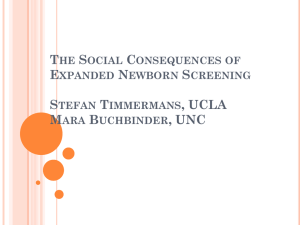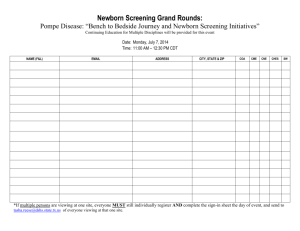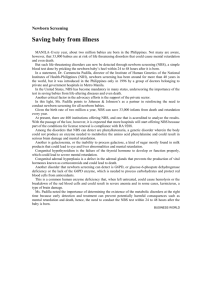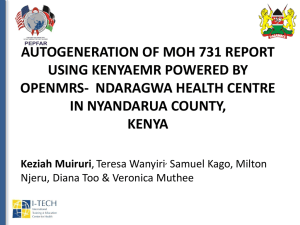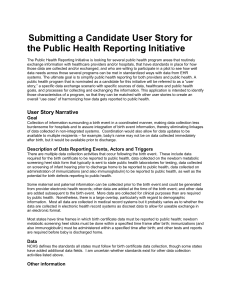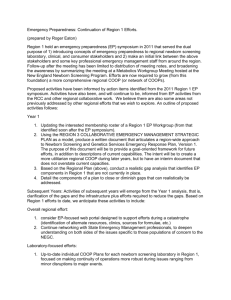APPENDIX 3
advertisement
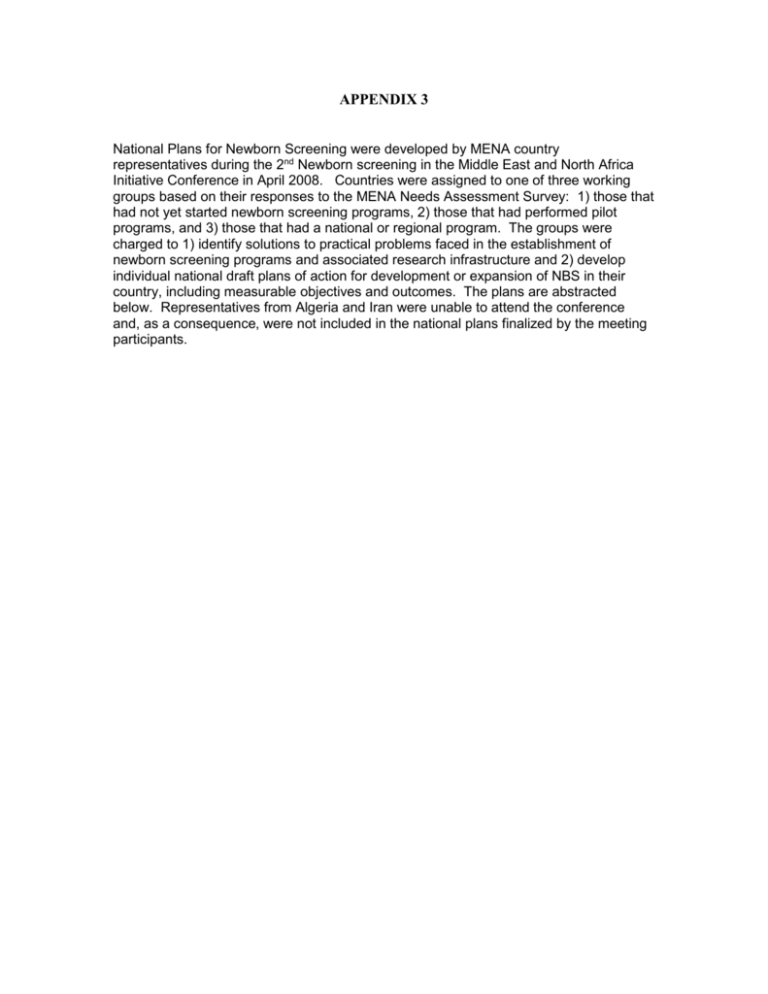
APPENDIX 3 National Plans for Newborn Screening were developed by MENA country representatives during the 2nd Newborn screening in the Middle East and North Africa Initiative Conference in April 2008. Countries were assigned to one of three working groups based on their responses to the MENA Needs Assessment Survey: 1) those that had not yet started newborn screening programs, 2) those that had performed pilot programs, and 3) those that had a national or regional program. The groups were charged to 1) identify solutions to practical problems faced in the establishment of newborn screening programs and associated research infrastructure and 2) develop individual national draft plans of action for development or expansion of NBS in their country, including measurable objectives and outcomes. The plans are abstracted below. Representatives from Algeria and Iran were unable to attend the conference and, as a consequence, were not included in the national plans finalized by the meeting participants. Country Plan Summary for Group 1 Countries, These countries have no national newborn screening programs and development and implementation of a pilot NBS program was their primary goal. COUNTRY PLAN Libya Meet with interested parties at the Neonatal Day Symposium to establish a NBS committee to develop plans for CH and PKU screening under the leadership of the Ministry of Health. The pilot study will be performed at Tripoli Medical Center/Zawia Teaching Hospital (20% of national births) and is to begin in April 2009. Blood spots will be collected 2-3 days after birth and sent abroad for testing. Results will be communicated to a central database headed by an epidemiologist who will send results to the caring neonatologist who will refer the patient to the appropriate sub-specialty for follow-up. Residual blood spots will be kept for 6 months and stored centrally. Pilot plan for CH and hearing screening was developed in 2007 and is awaiting Ministry of Health approval. The pilot is to be coordinated by the Department of Pediatrics at the Children’s University Hospital (CHU) with plans to initiate the program in 2009. Children will be screened for hearing within one day of birth and blood spots taken after 24 hours but before maternal discharge. Responsibility for collecting and analyzing the samples will rest with the Ministry of Health Laboratory. The newborn screening team will coordinate follow-up at CHU with referral by university pediatrician to parents within 2 days for long term follow-up. Will develop policies for storage and possible research use of the residual blood spots. For hearing test, (Echoscreen) results will be sent for referral at the Specialties University Hospital ENT Unit/Hearing specialist. The Pilot CH and PKU screen is to test 20-30% of the population under the leadership of a Joint Committee of the Ministry of Health, Syrian Atomic Agency Association, and Higher Education Ministry. Expected start is in late 2008 and completion in April 2010. Blood spots will be collected 3-4 days after birth and analyzed at the Syria Atomic Energy Commission Central Laboratory Samples will be stored for up to five years, TSH and free T4 will be analyzed in serum samples in hospitals and affected infants will examined and treated by an endocrinologist Pilot study to begin for CH and PKU in 2008 under the leadership of an Advisory Committee composed of the Pediatric Department at Thamar University, Faculty of Medicine, Ministry of Health, WHO, UNICEF, Social Disability Center, and the IAEA. Samples will be collected by nurses and midwives within 2 weeks of birth. Filter paper cards will be transported to a planned national central laboratory. Results will be relayed for follow-up to the primary health care center. Recall of positive screens will be done by the pediatrician and endocrinology specialists and infants treated by pediatricians with medication available from the MOH Morocco Syria Yemen Country Plans for Group 2 Countries. These countries have completed pilot studies for at least one condition and anticipate expansion to national programs COUNTRY Jordan Kuwait Lebanon Pakistan Tunisia PLAN Anticipate screening all newborns for at least one condition, CH, at the end of 2008. Currently have piloted PKU in 2 government directorates. G6PD and GALT will be added later. Have also initiated a nationally based pilot for metabolic tests and for hearing. Leadership lies with the MOH Department of Genetics & Congenital Diseases, tests and services are free and paid for by the government and insurance schemes. Blood spots are collected at 1 week (first visit) and sent to the central lab in Amman twice a week. Notification is provided by the MOH’s pediatrician in chief for treatment. Special units have been established for PKU. Establish a NBS program for CH & PKU by 2009, by developing protocols for all aspects of the screening system: health education campaign, training nurses in specimen collection, laboratory staff and establishing quality assurance programs and develop lines of communication for follow-up with physicians. MOH is currently providing testing free of charge and will coordinate with private testing. Blood spots will be collected the second day after birth and will be sent to a central lab. Physicians obtain confirmatory samples after receiving abnormal results sent to hospitals. Demonstration NBS program initiated in 1996 and since has been expanded to cover 50% of births. Plan on increasing to 100% by 2011 through a mandate from the MOH & Council of Ministers. Establishing a joint funding mechanism between the MOH and other agencies to cover costs; creating a steering committee with members from the 6 medical schools to set up clinical protocols. Currently, private sector performs NBS with plans to shift responsibility to the MOH. Samples collected at 36 hrs, and transported to laboratories. If abnormal, retest within 24 hrs and referred to specialized doctors and labs. Pilot study of CH screening performed on all births at Aga Khan Univ. AKU will serve as initial lead will involve MOH & heads of medical schools expanding program through medical schools and sister organizations incorporating visiting nurses from MOH. Blood spots will be obtained at 48 hrs for inpatients and for home births by female health visitors. Samples will be sent to the central lab at AKU, via satellite labs. The central lab will test all spots, maintain records of all data and inform referring physicians. All positive cases will be forwarded to referring doctors; patients will be treated by a pediatrician. In case of lost to follow-up the female health visitor will keep track of all those patients. Two pilots for CH and one for CH and PKU were undertaken. The goal is to establish a national program under the MOH and Ministry of Social Affairs. Anticipated start is 2009-2010. Blood spots will be collected by nurses with testing in Tunisian laboratories. Results will be communicated by pediatrician from maternity hospital to the family and the specialists. Country Plans for Group 3 Countries. All of the countries in this group screen for at least one condition, with a few screening for a large panel of metabolic conditions utilizing tandem mass spectrometry. Plans for expansion of national NBS were proposed that addressed increased coverage and/or addition of new conditions to the screening panels. COUNTRY Bahrain Egypt Oman Qatar Palestinian Authority Saudi Arabia United Arab Emirates PLAN Next priorities CAH, CH, PKU and pilot study for inborn errors of metabolism disorders for which available and cost effective treatments are available. Leadership lies with the MOH and a National Committee for NBS and coordinated through the Genetics Department. Implementation will be in stages. Cord blood is collected for blood disorders and blood spots for metabolic conditions will be obtained for at 36-48 hours. Notification will be through the Genetic Department to pediatricians. Expand NBS to cover 95% of live births for 2-3 conditions over 3 years. Prioritize conditions based on pilot studies and develop training for health care personnel and families. Blood spot collection is at 3-7 days. Positive test results confirmed through central laboratory and communicated to specialist physicians. Treatment is supported through the national health insurance and performed at 25 specialized centers for CH. Expand to short list of common metabolic conditions identified through a pilot study. Leadership lies with Department of Family and Community Health, with the pilot to be completed in 2009. Blood spots are obtained and samples transported to an outside reference laboratory. Plan to have web-based posting of test results with notification of primary care physician and specialists. Plan to develop diagnostic protocol and standardized case management Upgrade laboratory to develop independent MS/MS capability for the 36 conditions currently screened in 2009 including two new conditions, sickle cell and SCID. Currently, samples are sent to the University of Heidelberg which is providing training in Qatar. Leadership resides in the NBS Committee of the Hammad Medical Corporation. Blood spots collected 2-5 days via heel prick. Follow-up services are provided by the NBS unit including referral to specialists for short and long term treatment. Program to be refined to reach the entire population and consider including other conditions e.g. CAH. Leadership rests with the Palestinian MOH and expansion will be led by the by Department of Pediatric and Genetics at Makassed Hospital and Al-Quds Medical Schools. Samples are collected at 1 week at time of BCG vaccine and screened at the Central Laboratory of the Central Public Health Laboratories. PKU confirmation is sent to Israeli hospital and CH confirmed locally. Families are contacted through mobile phones and seen by specialists. A computerized database flags positives and then tracks them for referral. Increase the number of newborns screened since currently approximately 20% of births are tested for all 16 conditions. An additional 11 conditions are available locally. Leadership rests with the MOH and the Prince Salman Center for Disability Research. Blood spots are collected 12-36 hours and the National Laboratory for Newborn Screening coordinates with participating hospitals and the MOH. A database that will be ready in 2008 will provide monthly reports. Results communicated to the hospital and contacts with a clinical geneticist will be provided. Anticipated expansion to 20 conditions and hearing screening. Led and coordinated by the MOH. Samples are collected 12-72 hours after birth. Expanded tests will be added to current laboratory offerings. The central labs planning group have diagnostic and follow-up protocols. The computer system in the central laboratory tracks samples from the time they are taken through treatment.
